| Listing 1 - 10 of 29 | << page >> |
Sort by
|
Book
Year: 2004 Publisher: Wien : Böhlau,
Abstract | Keywords | Export | Availability | Bookmark
 Loading...
Loading...Choose an application
- Reference Manager
- EndNote
- RefWorks (Direct export to RefWorks)
In 1923 Count Richard Coudenhove-Kalergi, offspring of an aristocratic family in the Austro-Hungarian Monarchy, published the book Paneuropa which was soon translated into almost all important languages of the world. A movement was launched under the same name and soon became the synonym for all efforts concerning the creation of a united Europe in the interwar period and even beyond. The Count was convinced of the necessity to create Paneurope the main reasons being the danger of a second world war, Bolshevist Russia and the economic power of the United States of America. Since 1925 Paneurope Unions were founded in nearly every European capital; the headquarter were Vienna (Hofburg). But the movement failed in mobilizing the masses. Coudenhove who was the embodiment of Paneurope was only in contact with statesmen, industrial leaders and intellectuals. His great merit was the confrontation of European governments with the idea of a united Europe, the rising of European question. Despite of all his efforts European politicians were not able to realize the importance of "United States of Europe" in those days. Nationalism was too strong and there seemed to be no willingness to give up parts of the own sovereignity and to develop a better understanding for democracy. The study presents a comprehensive view of the Paneuropean Movement during the interwar period including records of the Moskow Archive (captured material). It opens with a biographical sketch followed by the political program and how it was adapted to the political situation of those days; other main items are fund raising, financial organisation and propaganda. Also, there is an analysis of Paneurope in interaction with contemporary Austrian and European policies. Another chapter is dedicated to the ideas to unite Europe economically (since 1933) or on a cultural basis (saving the Abendland). The longitudinal views are completed by sectional views which focussed on the way how Coudenhove and his Paneurope Movement dealt with ideologies and mental streams of these days; They fought Bolshevism and since 1933 against National Socialism; they sympathized with Italian Fascism; Paneurope was anti-democratic and aristocratic. Some of the aims were revolutionary but many people regarded them as utopian. In comparison with the European Union there are certain parallels between European Union and Paneurope. Today we can see Paneurope - with restrictions - as an avant-garde of the European Union. Im Jahr 1923 veröffentlichte der altösterreichische Graf Richard Coudenhove-Kalergi das Buch "Paneuropa", es wurde in fast alle Weltsprachen übersetzt und die gleichnamige Bewegung sollte alsbald das Synonym für sämtliche Europa-Vereinigungsbestrebungen in der Zwischenkriegszeit und darüber hinaus werden. Coudenhove sah in Paneuropa einen Weg, um einem weiteren Weltkrieg, der ideologischen Bedrohung durch die bolschewistische Sowjetunion und der großen amerikanischen Wirtschaftskonkurrenz entgegen zu treten. Ab 1925 entstanden in fast allen europäischen Hauptstädten sog. Paneuropa-Unionen, das Zentralbüro befand sich in der Wiener Hofburg. Paneuropa wurde nie eine Massenbewegung, Coudenhove, mit dem die Bewegung stieg und fiel, blieb auf der elitären Ebene der Politiker, Wirtschaftsfachmänner und Intellektuellen. Es war sein Verdienst, die europäischen Regierungen erstmals mit der Europafrage konfrontiert zu haben, wenngleich die damaligen Politiker nicht in der Lage waren, die Vereinigung des europäischen Kontinents zu bewerkstelligen. Zu stark waren die Staaten an ihre eigene Nation gefesselt sowie am Unvermögen, Souveränität in Teilbereichen aufzugeben und mit der Demokratie umzugehen. In dieser Arbeit wird unter erstmaliger Berücksichtigung des Moskauer Archivbestandes (Beuteakten aus dem Zweiten Weltkrieg) eine gesamtheitliche Darstellung der Paneuropa-Bewegung in der Zwischenkriegszeit geboten. Zunächst wird der Gründer der Paneuropa-Bewegung biografisch dargestellt; unmittelbar vor dem chronologischen Abriss der Paneuropa-Bewegung erfolgt die Analyse des Paneuropa-Programms und dessen Anpassung an die damaligen politischen Verhältnisse; die Erörterung organisatorischer Fragen wie bspw. die Finanzierung und propagandistischer Themen ergänzen diesen Schwerpunkt. Im Anschluss wird Paneuropa, in die europäische aber auch österreichische Politik der damaligen Zeit eingebunden, dargestellt; Schließlich erfolgt die Darstellung des Versuches ab 1933, Paneuropa wirtschaftlich bzw. gegen Ende der Bewegung kulturell zu vereinigen (Rettung des Abendlandes). Der Längsschnittdarstellung folgt die Querschnittdarstellung, nämlich über den Umgang Paneuropas bzw. Coudenhoves mit den Ideologien und geistigen Strömungen der damaligen Zeit. Im Vergleich zwischen Paneuropa und Europäischer Union findet man einige Parallelen, sodass man - - mit Einschränkungen - durchaus Paneuropa als Avantgarde für die Europäische Union bezeichnen kann.
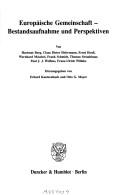
ISBN: 3428078608 3428478606 Year: 2022 Publisher: Berlin : Duncker & Humblot,
Abstract | Keywords | Export | Availability | Bookmark
 Loading...
Loading...Choose an application
- Reference Manager
- EndNote
- RefWorks (Direct export to RefWorks)
European federation --- Congresses --- European Economic Community --- Congresses.
Book
ISBN: 9782130569923 2130569927 2940549079 Year: 2008 Publisher: Paris: PUF,
Abstract | Keywords | Export | Availability | Bookmark
 Loading...
Loading...Choose an application
- Reference Manager
- EndNote
- RefWorks (Direct export to RefWorks)
Ce volume publié sous forme d'hommage au professeur Pierre du Bois, décédé subitement en juin 2007, regroupe les contributions de ses collègues, amis et anciens doctorants sur le thème de la construction européenne qui était l'un des thèmes de prédilection. Cinq aspects de la question européenne sont mis en lumière par les différents auteurs : les origines de l'idée d'Europe (Bruno Arcidiacono, Jean-François Bergier, Lubor Jilek, Alfonso Mattera), l'Europe et ses constructeurs (André Rezler, Benedikt Shoenborn, Georges-Henir Soutou), l'Union européenne et les institutions (Marie-Thérèse Bitsch, Victor-Yves Chebali, Gilles Grin), L'Union européenne et le monde (Franz Blankart, Mohammad-Reza Djalili et Thierry Kellner, Jussi Hanhimäki), et enfin l'élargissement de l'Union européenne (Adrian Ivan, André Liebich). L'ouvrage débute par un essai bibliographique sur Pierre du Bois (Basil Germond et François Jequier). Ces mélanges, riches et diversifiés, mettent en lumière une interrogation pluridisciplinaires sur la question européenne, où histoire, science politique, économie, droit et philosophie sont indissociables.
European federation --- European Union --- European federation - Congresses --- E.U. --- Union européenne --- identité --- construction européenne
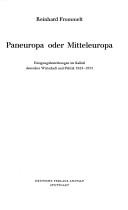
ISBN: 342101793X 3486703463 Year: 1977 Publisher: De Gruyter
Abstract | Keywords | Export | Availability | Bookmark
 Loading...
Loading...Choose an application
- Reference Manager
- EndNote
- RefWorks (Direct export to RefWorks)
Als Reaktion auf die Krise Europas nach dem Ersten Weltkrieg formierten sich auf dem Kontinent zahlreiche internationale Verbände, die bei aller Konkurrenz der wirtschaftlichen Kooperation und der politischen Einigung zwischen europäischen Ländern den Weg bereiten und damit der durch die Friedensregelung noch sanktionierten nationalstaatlichen Partikularisierung in Europa entgegenwirken wollten. Reinhard Frommelt beschreibt die organisatorischen Ansätze, zeigt die gesellschaftliche Basis und analysiert die politisch-wirtschaftlichen Zielvorstellungen jener Verbände in der Weimarer Republik. Im Mittelpunkt der Untersuchung steht die Frage nach ihrem Standort und ihrer Funktion im Konfliktfeld handelspolitischer Interessen der Wirtschaft und einer revisionistischen amtlichen Außenpolitik. So wird deutlich, dass die Paneuropa-Union, die ebenso militant antibolschewistisch wie antiamerikanisch auftrat und ein neo-kolonialistisches Konzept verfocht, in furchtlose Spannungen zur pazifistisch-liberalen Verständigungsaktion geriet, die Völkerbundidee und Revisionismus zu vereinbaren suchte. Solche Spannungen führten zur Unterwerfung unter das Kalkül sich kreuzender wirtschaftlicher Interessen und politischer Ziele; am Ende konnte nur der Misserfolg dieser auf deutsch-französischen Ausgleich bedachten Verbände stehen. Nicht weniger deutlich wird der Erfolg der traditionellen Bewegung für ein deutsches Mitteleuropa. In den Jahren der Weltwirtschaftskrise vereitelte sie die Schaffung einer die Nachfolgestaaten umfassenden Donauföderation und deckte den namentlich von schwerindustriellen Kreisen forcierten deutschen Wirtschaftsimperialismus in Südosteuropa. Die Ergebnisse der Darstellung erhellen nicht allein Aspekte der Vorgeschichte nationalsozialistischer Großraumwirtschaft, sie liefern überdies einen Beitrag zur Erkenntnis historischer und struktureller Bedingungen für internationale Integration und Friedenssicherung in der Epoche zwischen den Weltkriegen.
European federation --- Federation of Europe --- Pan Europa movement --- Paneuropean federation --- United States of Europe (Proposed) --- Federal government --- Regionalism (International organization) --- Europe --- Germany --- Council of Europe countries --- Eastern Hemisphere --- Eurasia --- Relations --- -Relations --- -European federation --- -European federation. --- European federation.
Book
ISBN: 1040176569 1003247830 1032162740 Year: 2024 Publisher: Oxford : Taylor & Francis Group,
Abstract | Keywords | Export | Availability | Bookmark
 Loading...
Loading...Choose an application
- Reference Manager
- EndNote
- RefWorks (Direct export to RefWorks)
This edited volume explores the role of education in the process of European cooperation and integration as it has been conceived and realized in the late 20th century and the early 21st century, as well as the mirror of this narrative: the effects of the European integration process on education.
Education and state --- Nationalism and education --- European federation.
Book
Year: 2012 Publisher: Munich, Germany : Südosteuropa-Gesellschaft,
Abstract | Keywords | Export | Availability | Bookmark
 Loading...
Loading...Choose an application
- Reference Manager
- EndNote
- RefWorks (Direct export to RefWorks)
Papers presented at a conference held Feb. 13-18, 1994, Universität Tübingen. Durchsuchbare elektronische Faksimileausgabe als PDF. Digitalisiert im Rahmen des DFG-Projektes Digi20 in Kooperation mit der BSB München. OCR-Bearbeitung durch den Verlag Otto Sagner.
European federation --- Architektur --- Bevölkerung --- Europa --- europäischen --- Föderalismus --- Integration --- Integrationsprozess --- Serbien --- Slavische Sprachwissenschaft --- Wenturis
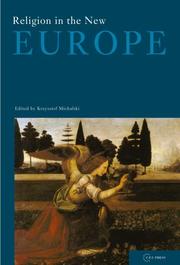

ISBN: 9786155053900 2821815050 6155053901 9637326502 9789637326486 9789637326493 9789637326509 Year: 2006 Volume: 2 Publisher: Central European University Press
Abstract | Keywords | Export | Availability | Bookmark
 Loading...
Loading...Choose an application
- Reference Manager
- EndNote
- RefWorks (Direct export to RefWorks)
The articles in this volume deal with the role of Christianity in the definition of European identity. Europeans often identify advanced civilizations with secularity. But religion is very much alive in other fast developing countries of the world. In Europe, nevertheless, the organized churches very much wanted to stress the Christian character of European identity, and this engendered a lively protest focusing on the perceived threat to the secular European tradition. Also, Europe is facing its greatest cultural challenge in the demand of Turkey to be admitted as a member, and in the demand of many Muslims in Europe, often citizens of the countries in which they live, to be recognized in their difference and at the same time integrated in the European national and supranational institutions.
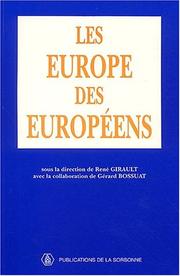
ISBN: 2859442383 2859448659 9782859442385 Year: 1993 Volume: 45 Publisher: Paris: Publications de la Sorbonne,
Abstract | Keywords | Export | Availability | Bookmark
 Loading...
Loading...Choose an application
- Reference Manager
- EndNote
- RefWorks (Direct export to RefWorks)
Ce livre rend compte des réflexions d’historiens européens sut la question primordiale de l’identité et de la conscience européennes. Un certain doute vient de saisir les Européens après la chute du mur de Berlin. L’Union Economique et Monétaire ne semble plus si aisée ; les guerres internationalités en Europe balkanique reprennent. L’Europe de l’Est rêvait d'un passage en douceur à l'économie de marché et à la prospérité. Or de larges fractions de la population souffrent. L’appel à la Communauté économique européenne n’est pas entendu. Après le rideau de fer, voilà que tombe un rideau de dollars, tandis que les Balkans s’embrasent. Sarajevo, encore ! Des historiens européens se sont réunis pour tenter d'élucider les regards que les peuples et les élites d’Europe se portent mutuellement depuis le début du siècle. Ils nous disent que derrière le mot Europe se cachent en fait de puissantes aspirations nationales. Et pourtant l’Europe existe, pas seulement comme un mot sur un atlas, mais aussi dans l'imaginaire, les discours et les pratiques sociales ou culturelles de nombreuses populations européennes. Mais en même temps elle est insaisissable, sinon le temps d'une conférence ou d'un livre sut l’Esprit européen. Elle meurt en 1919; elle vivait donc ! on la souhaite active en 1992 pour résoudre les conflits européens ou mondiaux. Référence obligée. L’Europe n'est pas la même pour chacune des grandes nations, pont chacun des groupes sociaux dans cette nation. Ne serait-elle que le souvenir pieux d'un glorieux passé chrétien et impérial ? Les historiens européens ont mené l’enquête avec profondeur et compétence dans le passé proche des grandes nations de l’Europe occidentale et orientale. Ils n'ont pas trouvé l’Europe, mais des images brisées ou variées de l'idée d’Europe. Le regard qu'ils portent sur les nations européennes éclaire parfaitement les ambiguïtés actuelles. L’unité de l’Europe n'est pas inéluctable. Elle est indispensable.
Europeans --- Européens --- Ethnic identity --- Congresses --- Identité ethnique --- Congrès --- European Union --- Europe --- History --- Politics and government --- Histoire --- Politique et gouvernement --- European federation --- European federation. --- Européens --- Identité ethnique --- Congrès --- Europe - Politics and government - 1989 --- -Europe --- union européenne --- identité européenne --- relations économiques --- -European federation --- EUROPE --- IDENTITE CULTURELLE --- VIE INTELLECTUELLE --- EUROPEENS --- INTEGRATION EUROPEENNE --- SOCIETE EUROPEENNE --- CIVILISATION --- 20E SIECLE --- HISTOIRE --- POLITIQUE ET GOUVERNEMENT --- Vie intellectuelle
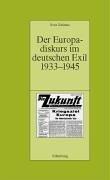
ISBN: 3486568299 3486835386 Year: 2004 Publisher: De Gruyter
Abstract | Keywords | Export | Availability | Bookmark
 Loading...
Loading...Choose an application
- Reference Manager
- EndNote
- RefWorks (Direct export to RefWorks)
Die Europaidee möglichst frei von jedem Dogma immer wieder neu auf ihre Realisierungsmöglichkeit zu prüfen, dies war das kontinuierliche Motiv des deutschen Exils. In intensiv geführten Debatten wurden tragfähige Konzepte entwickelt, die nach der Überwindung des Nationalsozialismus eine dauerhafte Befriedung Europas versprachen. In der politischen und gesellschaftlichen Isolation des Exils wurde Europa zum Inbegriff einer neuen, die Idee der Nation überwindenden Identität.
Political refugees --- European federation --- Exiles --- Germans --- Anti-Nazi movement. --- Anti-fascist movements --- National socialism --- Ethnology --- Persons --- History --- Europe --- Politics and government
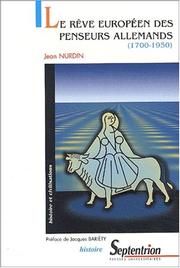
ISBN: 2859397760 2757422324 9782859397760 Year: 2003 Volume: *21 Publisher: [Villeneuve-d'Ascq]: Presses universitaires du Septentrion,
Abstract | Keywords | Export | Availability | Bookmark
 Loading...
Loading...Choose an application
- Reference Manager
- EndNote
- RefWorks (Direct export to RefWorks)
L’Europe en construction est-elle vraiment celle qu’espéraient il y a un demi-siècle ses initiateurs ? Ne s’éloigne-t-elle pas de l’objectif premier de leur action, à savoir une imposante fédération reposant sur le « noyau dur » de la réconciliation franco-allemande ? L’Europe est et doit être davantage qu’un grand ensemble économique et commercial, car elle est d’abord une idée qui fut longtemps l’apanage d’une élite de la pensée. Les auteurs d’expression allemande y occupèrent une place exceptionnelle et c’est une analyse de leurs conceptions européennes que propose le présent ouvrage, dont l’objet est de montrer combien la réflexion de ces « penseurs allemands » a contribué à enrichir le débat sur l’Europe, son identité, sa culture, son organisation et son avenir. Philosophes, écrivains, historiens, publicistes ou hommes d’Etat, ces hommes, célèbres ou peu connus, ont souvent fait preuve d’une lucidité et d’une prescience hors du commun. Leurs conceptions méritent d’être évoquées à une époque où l’Europe s’interroge sur elle-même et sur son avenir.
Intellectuals --- Intellectuels --- History. --- Histoire --- Europe --- Romanticism --- European federation. --- European federation --- Philosophy --- History --- Philosophy [German ] --- Germany --- Relations --- Foreign public opinion, German. --- Civilization. --- Federation of Europe --- Pan Europa movement --- Paneuropean federation --- United States of Europe (Proposed) --- Federal government --- Regionalism (International organization) --- Council of Europe countries --- Eastern Hemisphere --- Eurasia --- Romanticism - Germany. --- utopie --- élite --- homme d'état --- histoire --- réconciliation franco-allemande --- rêve européen
| Listing 1 - 10 of 29 | << page >> |
Sort by
|

 Search
Search Feedback
Feedback About UniCat
About UniCat  Help
Help News
News